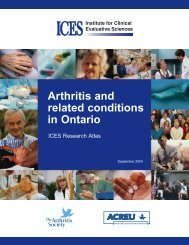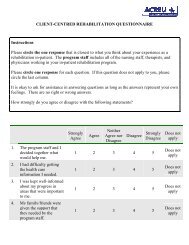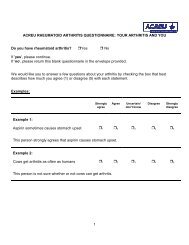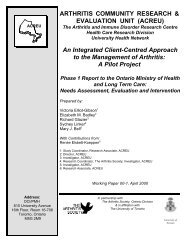Client-Centred Rehabilitation - Arthritis Community Research ...
Client-Centred Rehabilitation - Arthritis Community Research ...
Client-Centred Rehabilitation - Arthritis Community Research ...
You also want an ePaper? Increase the reach of your titles
YUMPU automatically turns print PDFs into web optimized ePapers that Google loves.
36<br />
readmission were important to our focus<br />
group participants.<br />
The greatest barrier to access was difficulty<br />
in identifying services that are available. Not<br />
knowing where to find help was a concern<br />
for many of the participants. Physicians<br />
were not necessarily knowledgeable about<br />
community resources. Participants described<br />
having to find services and resources on<br />
their own or with the help of their families.<br />
Information about these resources was<br />
lacking for both the heath professionals and<br />
clients.<br />
“I had absolutely no contact with<br />
The <strong>Arthritis</strong> Society. I didn’t know<br />
they existed” PTPART #2<br />
“But there is nothing to help you.<br />
There probably is but I don’t know<br />
about or I didn’t know about it.”<br />
ARTH #4<br />
“I guess one of the things that<br />
everyday I discover another resource<br />
or something like that that’s out there<br />
but its not obvious …You feel pretty<br />
alone and its not that the programs<br />
aren’t there, they’re just not<br />
communicated to you in any<br />
consistent way.” SCI #1<br />
Referral issues were raised by all groups and<br />
had several common themes. Pushing or<br />
fighting for a service while at the same time<br />
dealing with a condition was a common<br />
problem that was very difficult for many of<br />
the participants.<br />
“So I’m not fighting just the<br />
emotional trauma of having to deal<br />
with the brain injury itself; I am also<br />
having to deal with the medical<br />
system that is not servicing us<br />
appropriately” ABI #1<br />
“I knew I could ask for it but I<br />
couldn’t be bothered. There was too<br />
much to cope with….to bother<br />
hassling…If I have to hassle to get<br />
this for two hours twice a week its<br />
not worth it.” PTPART #1<br />
Lack of knowledge and information on the<br />
part of health professionals of the roles of<br />
other health care providers and available<br />
services was a barrier to appropriate<br />
referrals. All groups talked about the lack<br />
of knowledge of health professionals,<br />
particularly general practitioners, about the<br />
system.<br />
“Once you get at home, you get your<br />
own routine from your own family<br />
doctor, they don’t tell you a whole<br />
lot. One time if something goes<br />
wrong, suppose you got a cold or<br />
pneumonia or you broke this, you<br />
broke that…you know, fix that but<br />
that’s about it. But, if you want to<br />
know about some new program or<br />
something like that they have no<br />
idea. You know a lot of times<br />
they’ll say, “Well, if you do have<br />
some information, bring it back<br />
because I’d like to hear about it.”<br />
SCI #3<br />
“They [doctors] don’t know what is<br />
out there. They don’t know how to<br />
refer. They don’t know where to<br />
refer them” PTPART #1<br />
All groups mentioned that waiting period for<br />
access to services was too long and that<br />
during the waiting time they often lost even<br />
more function.<br />
“they say there is going to be a<br />
waiting period and thank God it was<br />
shorter than they thought. It was still








